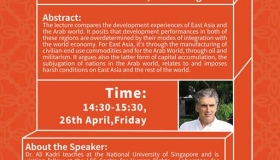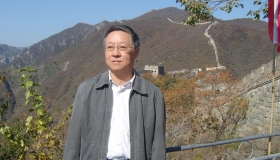Teahouse and Everyday Urban Culture: Symphony of Space and Time
The teahouse, a lasting symbol of Chinese mass culture, continues to develop in this era of far-reaching political changes, modernization, and globalization. An in-depth understanding of the social, cultural, and political roles of teahouses will give us a holistic view of the Chinese urban society. In addition, the study of teahouses and public life under socialism helps us to understand how this limited urban space and public life have changed throughout the second half of the 20th century, and how it demonstrates the political culture of modern China.
Topic: Teahouse and Everyday Urban Culture: Symphony of Space and Time
Speaker: Prof. Wang Di
Date: Friday, 30 November 2018
Time: 4:15 p.m. - 5:30 p.m.
Venue: Governing Board Meeting Room, Dao Yuan Building
Language: Chinese
【Speaker Profile】
Wang Di is currently a Distinguished Professor and Head of the Department of History of the University of Macau and co-editor of the academic quarterly "Frontiers of History in China". Prof. Wang obtained his Ph.D. in East Asian history from Johns Hopkins University and served as Professor of Department of History, Texas A&M University, and former president of the Chinese Historians in United States (CHUS). His research on Chinese social history, urban history, new cultural history, everyday culture history and micro-history has great influence in Chinese and Western academic circles.
He has received many awards, including The Fulbright Senior Scholarship,The Best Book (Non-North American) Award from the Urban History Association. The Chinese translation of “Street Culture in Chengdu” was selected as the top 10 best books in 2006 by Zhonghua Dushu Bao and another work on teahouse was titled “Book of the Year” by the Southern Metropolis Daily. Wang's representative works include "Street Culture in Chengdu", "The Teahouse: Small Business, Everyday Culture and Public Politics in Chengdu, 1900-1950", "Violence and Order on the Chengdu Plain: The Story of a Secret Brotherhood in Rural China, 1939-1949" (Stanford University Press) and "The Teahouse under Socialism: The Decline and Renewal of Public Life in Chengdu, 1950-2000" (Cornell University Press).





